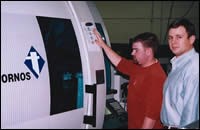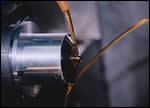Vegetable Oil Improves Machining Of Medical Devices
Production management at this shop speculated that many of the materials used and operations performed might benefit from the higher level of lubricity characteristic of vegetable oils. Any consequent additional capacity and tool life would be a plus.
After an ordeal with the coolant used in CNC milling and turning centers in another area of the shop, JKB Tool Company, Inc. (Milford, Connecticut) decided to test an alternative oil to what it had been using in its CNC screw machines. Production management speculated that many of the materials used and operations performed might benefit from the higher level of lubricity characteristic of vegetable oils. Any consequent additional capacity and tool life would be a plus.
During the past 20 years, JKB Tool has grown and become a subcontractor to many Fortune 500 companies in medical devices as well as defense and aerospace products, providing services ranging from design and prototype development to long production runs of standard items. Much of the production is in the medical field and includes an assortment of bone screws, orthopedic implant devices, and medical tools and instruments produced on cells of CNC screw machines and CNC mill and lathe machines.
JKB Tool tested the new vegetable oil on its new Tornos Decco machine. The problem with the oil was its smell, which increasingly bothered operators who were used to years of working with mineral oil. Vegetable oil has a different, although usually faint, smell. It stems not from biological degradation during machine downtime but from the interaction of heat, mechanical pressure and agitation during use. Depending on materials, operations and other factors, the oil can smell like old kitchen grease to some people.
The odor can usually be effectively abated with various deodorants, but in this case the effectiveness of the deodorant built into the formulation wore off more quickly than oil needed to be replenished during normal operation.
At one point, the new machine was running a hard job, machining a titanium bone screw that required some unique milling. “We had been running for about 6 weeks, and the smell only intensified,” says Mr.Blake. “The deodorant was initially strong, but soon seemed to lose its effectiveness. We decided to abort the trial and go back to the true and tested.”
The oil was changed in the middle of the job without any other adjustments to the machine, and the machine started up again. Within minutes, overheating tools sparked a flash fire. It was quickly suppressed by filling the chamber with CO2, and it did not inflict damage.
“It was an eye-opener,” says Mr. Blake. “We have had other fires, usually caused by tools breaking or excessive wear. But when it happened after just changing the oil, it told me that we must have been getting very good feeds and speeds.”
The company took a closer look at machining results, and—after finding a way to fight the odor—decided to switch the shop’s five CNC screw machines to the vegetable oil.
By itself, vegetable oil is often used as a polar (because of the di-polar nature of its molecules) additive to enhance the lubricity of mineral-oil-based cutting oils. Vegetable oil’s lubricity stems from a combination of this molecular structure and the molecules’ consequent chemical attraction to metal surfaces. The long, di-polar molecules align themselves perpendicularly and highly symmetrically along a metal surface to produce a thick and dense lubricating film that is exceptionally resilient to the pressure between the part and the cutting tool.
The tested oil—Vascomill 42—was supplied by metalworking fluid producer Blaser Swisslube. The formulation is based on a blend of food-grade vegetable oils derived from plant life cultivated and refined to optimize attributes favorable to machining. It is stable and fully compatible with human skin and the special requirements pertaining to the machining of medical implant parts.
Gundrilling, Threading Operations Improve
The CNC screw machine area of the shop is standardized on barstock-fed Tornos Decco 2000 machines with ten-axis operation with counter spindle, and with parallel numerical control (PNC) capable of five simultaneous operations.
An abundance of titanium and a variety of types of stainless steel grades (mostly 303 and 316), as well as aluminum, some brass, beryllium copper and plastics are used in the fabrication of the dozens of medical parts at JKB Tool. The high-end carbide tools and inserts used reflect the precision requirements and small work envelope of the shop’s production: part diameters range from 0.040 inch to 0.750 inch, and 0.0001-inch tolerances or better are typical.
All aspects of the screw machines’ performance have benefited from the change to vegetable oil. Taking into account all operations, speeds and feeds have increased by 25 to 30 percent. “Even in just regular turning, we have seen excellent improvements in cycle times and tool life,” Mr. Blake says.
Two examples of progress involve two of the tougher operations in the production of titanium bone screws: threading and gundrilling.
A shop specialty, titanium bone screws—used for spinal corrective surgery—are produced by the hundreds of thousands to stringent demands on tolerances, surfaces properties, cleanliness and even packaging. They can range in length and OD from 6 mm to 80 mm, and 2 mm to 8.5 mm, respectively, and they typically require a machined 0.4-micron to 0.8-micron surface finish and a physical tolerance of ± 0.025 mm.
Customer specifications also often include the addition of an anodized coating for the purpose of color coding different sizes and types of screws. Surface finishes and tolerances must take into account the coated layer, allowing for additions or reductions in material.
JKB Tool relies on thread whirling on all the machines in the production of these parts. The process tends to be faster and more accurate than conventional single-point turning in developing the somewhat complex thread shapes needed for the bone screws.
Since the introduction of the vegetable oil, the thread whirlers—producing 1.9-mm pitch to 7.4-mm pitch threads, depending on the size of the screw—have been 30 to 35 percent more productive. Tool life is up approximately 20 to 25 percent.
Certain orthopedic procedures require the use of cannulated bone screws, screws with a hole throughout their full length. JKB Tool prefers to drill the hole rather than rely on cannulated stock. Given the materials (6Al-4V titanium and 316L stainless), the small ID and the length of the hole, the required gundrilling operation is prone to overheating, excessive tool wear and some breakage. In fact, at these small diameters (1.5 mm to 2.5 mm), the operation can be quite unpredictable; tools break before any symptoms show up.
One frequently produced bone screw requires gundrilling 6AL-4V titanium up to 4.5 inches deep using a 0.059-inch diameter gun drill, an operation performed with the drill running at 9,000 rpm and the cutting oil applied through the tool at 1,850 psi.
“In this operation, tool life has improved drastically, producing a significant reduction in tool cost,” Mr. Blake notes. “Before the oil was changed, we would get about 15 parts to a drill. Now we get about 50 to 100 parts between tool changes, and often more; it has been as high as several hundred.
“There are always random events that cause tool breakage at these diameters,” Mr. Blake continues, “but, on average, we have a four or five time improve-ment in tool life that can only be attributed to the oil.
“At the same time, we have been able to increase speeds and feeds by 40 to 50 percent. Production runs can be extensive (thousands of pieces), so the incremental improvements in cycle time and scrap have significantly improved productivity.”
Consumption of cutting oil is down appreciably. The low, temperature-stable viscosity of Blaser’s Vascomill formulation contributes to having less dragout than experienced before. And the oil’s comparatively high flash point temperature—450°F compared to around 330°F for a mineral oil with high viscosity—contributes to having little or no smoke formation. Previously, some jobs, particularly stainless steel bone screws, produced significant amounts of smoke.
“The Blaser oil is significantly higher in price than the previously used mineral-oil-based formulation,” Mr. Blake says. “But when considering the reduced consumption, we are breaking even on an annualized basis, without taking into account the improvements in productivity and tool life.”
Related Content
When a CNC Turn-Mill Doesn’t Turn
A shop in Big Sky Country uses a B-axis multitasking machine to produce complex, prismatic medical parts that require no turning complete from barstock.
Read MoreNew Cutting Tool Technology Discovered at Paul Horn Open House
During a tour of the company’s campus in Tubingen, Germany, I and more than 3,000+ others were introduced to a number of new advances the company has made in cutting tool technology particularly as it relates to the medical industry.
Read MoreMeeting Stringent Cleaning Goals With Modular Ultrasonic System
A knee implant manufacturer implements an advanced cleaning system that meets its tight cleaning requirements, including documenting, validating and tracing the entire cleaning process.
Read MoreThe Control’s Role in Machining Complex Parts
This company that produces medical implants finds value in the CNC for its turn-mill equipment that helps speed setups and simplify programming when producing intricate parts complete.
Read MoreRead Next
Emerging Leaders Nominations Now Open
Here’s your chance to highlight a young person in your manufacturing business who is on the path to be a future leader moving your company forward.
Read More5 Aspects of PMTS I Appreciate
The three-day edition of the 2025 Precision Machining Technology Show kicks off at the start of April. I’ll be there, and here are some reasons why.
Read MoreA Tooling Workshop Worth a Visit
Marubeni Citizen-Cincom’s tooling and accessory workshop offers a chance to learn more about ancillary devices that can boost machining efficiency and capability.
Read More









.jpg;maxWidth=300;quality=90)

.jpg;maxWidth=300;quality=90)












